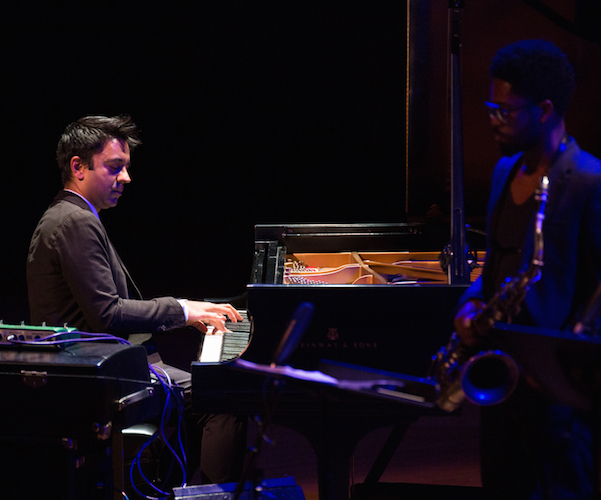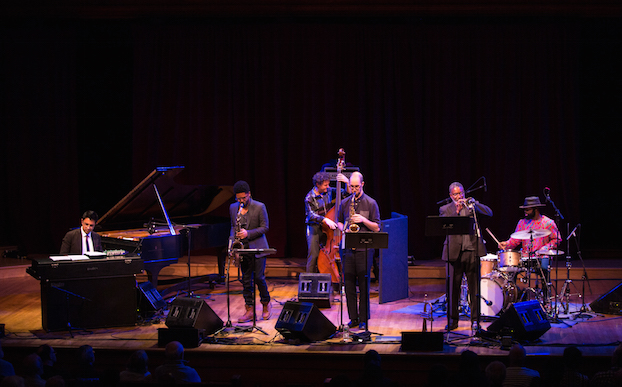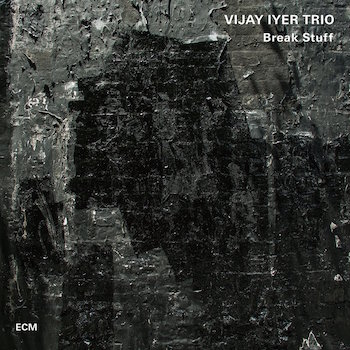Jazz Review: Vijay Iyer Sextet at Sanders Theater — Speak, Memory
This is music that says things that cannot be said any other way, music that cannot wear its heart on its sleeve.

Pianist Vijay Iyer playing with his sextet at Sanders Theater. In shadow at right: tenor saxophonist Mark Shim. Photo: Robert Torres.
By Steve Elman
[Disclosure: I received press tickets to this event from the Celebrity Series.]
Sometimes you have to listen to the memories of a performance to hear what you really heard. The more I replay in my head the two hours of music performed by pianist Vijay Iyer’s sextet at Sanders Theater on March 9, the more profound it seems.
My first impressions deceived me: I thought I heard a beautifully crafted long-form exercise in pure music that was somewhat monochromatic – all modalities and tensions, without enough spots to rest and release. But then I mentally re-heard Graham Haynes’s thoughtful flugelhorn solos, I smiled recalling the extraordinary heart of Stephan Crump’s bass support, and I remembered Iyer’s puckish grin as he heard his bandmates interpret his music.
I’m sure I wasn’t the only one for whom the first take was misleading. As I left the hall, I heard some random negative impressions from other listeners– a man expressing dissatisfaction with the abstractness of the music, a woman musing that she had to work very hard to appreciate what was going on. But there had been an unequivocal standing ovation from the audience of 1000+ a few moments earlier that spoke very differently, and there had been Iyer’s wry compliment to the audience over the final cadences of the performance: “We can hear you listening. You sound very good.”
What I really heard, I realized, was a very old phenomenon in jazz, at least as old as bebop: a cross-threading of austerity and heat, a fabric without the romantic colors of the 32-bar pop song or the deep blues of the blues. This is music that says things that cannot be said any other way, music that cannot wear its heart on its sleeve. This was Bud Powell’s way, and Herbie Nichols’s way, and Andrew Hill’s way. If you come to music like this expecting easy satisfactions and familiar comforts, you will inevitably be disappointed.
Music working in this way is almost always pan-tonal or modal, because traditional sequences of chords can be emotional anchors, holding soloists to a certain range of feeling when they improvise and restricting them from using all the notes they want to play. Miles Davis and George Russell and Ornette Coleman chafed under those restrictions, and each of them found his own way to freedom.

The sextet in performance at Sanders. Left to right: pianist Vijay Iyer, tenor saxophonist Mark Shim, bassist Stephan Crump, alto saxophonist Steve Lehman, cornetist Graham Haynes, and drummer Marcus Gilmore. Photo: Robert Torres.
Vijay Iyer has found his way, too. Some of his tools come from his own heritage as an American of Tamil descent. Some of them come from iconoclasts he admires, like Andrew Hill and saxophonist Julius Hemphill. Some of them are grafted on to motifs or vamps from popular music. Some of them are gifts from the masters, Miles Davis and John Coltrane, the ones who set everyone free.
The Cambridge performance by Iyer’s sextet is part of a warm-up tour for their upcoming recording, due to be released later this year. But it raises some serious questions because, in Iyer’s vision, the unity of a live performance is apparently a very different thing from the variety of a CD. From first note to last at Sanders, this music felt all of a piece, moving from a funkish setup, with Iyer showing off some echoplex effects on his electric piano, to a nearly-spiritual conclusion, with the music rising and rising to a long-delayed peak, reaching toward a single note that seemed to resolve all the dissonance that had come before. The one break in the flow of the music, where Iyer announced some of the tune titles, seemed unnecessary. (It was useful to know that his composition “Out the Tunnel” was based on a couple of ostinatos from a tune called “Buzzing” by Asian Dub Foundation, but the performance would have felt complete without that information.)
A CD inevitably has less patience than a concert. How is he going to change or adapt this tightly-integrated work to a medium that expects a beginning, middle, and end to every composition?
Well, no matter how it comes out, the CD will be welcome, because this band has never had the chance to record before, and it deserves to be memorialized before any of its players – each of whom has an active solo career – gets itchy to do another project on his own. Iyer’s long-standing trio is the foundation of the group, and its rapport is uncanny but understandable, since drummer Marcus Gilmore has been working with Iyer for more than eight years, and bassist Stephan Crump has been associated with him for almost two decades. Crump is a real find; he seemed to know where Iyer was going even in the freest moments of the music, supplying warm root notes and never cluttering the movement forward.
Iyer restricted his own solo spots to some choice unaccompanied moments, a ballad break with arco bass, and several short solos – except for his last featured spot of the evening, which was more extensive and a model of intelligent construction. He left the major statements to his featured soloists, and he chose them with the brilliance of a great casting director. Each one of these actors has a distinctive voice, each one speaks eloquently, and when they are called upon to work as an ensemble, they seem to think as one.

Tenor player Mark Shim has an admirable depth – if he is not quite as original as the other two horn players, that shouldn’t be seen as faint praise; he easily outplayed his colleagues in his short fiery solos in “Far From Over.” Steve Lehman has a distinctive, brittle, heavily arpeggiated approach that requires formidable technique; what at first seems idiosyncratic in his playing resolves into a well-considered style with energy to spare.
But the solos I remember best were the statements by Graham Haynes, who first played cornet, the instrument that might be considered the brasher, sharper younger brother of the trumpet, and then moved to flugelhorn, the trumpet’s older and wiser sibling. Each of his solos showed what could only be called wisdom, and they demonstrated that he is woefully underappreciated, which is especially surprising since he is the son of a revered jazz master, drummer Roy Haynes.
And there are more Roy Haynes connections with this band. Drummer Gilmore is Haynes’s grandson, and he wears granddad’s shoes comfortably – playing all around the kit, getting plenty of variety in percussive sounds, and soloing powerfully but without bombast. Is it just a coincidence that he’s working with Iyer in the same role his grandfather had with one of Iyer’s influences, pianist Andrew Hill? Maybe it’s destiny . . . or maybe it’s justice, since Iyer has achieved the great success that eluded Hill, in a style that Hill would recognize and respect. The Celebrity Series did us a great favor by presenting Iyer once again. On the strength of the music his band played at Sanders in March, I feel pretty certain that he will be a part of their regular roster of artists for years to come.
More:
Vijay Iyer’s most recent trio recording with Stephan Crump and Marcus Gilmore is Break Stuff (ECM, 2015). They have also recorded Acclerando (ACT, 2012) and Historicity (ACT, 2009).
Iyer’s touring itinerary includes these dates with the sextet:
May 9 (with Tyshawn Sorey in the trumpet chair): Village Vanguard, NYC
May 19: Logan Center for the Arts, Chicago
May 20: Wexner Center for the Arts, Columbus OH
Other upcoming performances include:
May 5: Iyer’s extended work Radhe Radhe: Rites of Holi, partially inspired by Stravinsky’s Le Sacre du Printemps, with Iyer and the International Contemporary Ensemble, conducted by Stephen Schick, at Cullen Theater, Wortham Center, Houston TX (presented by Da Camera of Houston)
July 20 (with the trio): Wigmore Hall, London
August 4 & 5 (duos with trumpeter Wadada Leo Smith): Newport Jazz Festival,
Fort Adams State Park, Newport RI
Steve Elman’s four decades (and counting) in New England public radio have included ten years as a jazz host in the 1970s, five years as a classical host in the 1980s, a short stint as senior producer of an arts magazine, thirteen years as assistant general manager of WBUR, and currently, on-call status as fill-in classical host on 99.5 WCRB since 2011. He was jazz and popular music editor of The Schwann Record and Tape Guides from 1973 to 1978 and wrote free-lance music and travel pieces for The Boston Globe and The Boston Phoenix from 1988 through 1991.
Tagged: Celebrity-Series, Graham Haynes, Mark Shim, Stephan Crump, Vijay Iyer

I just listened to Iyer for an hour, after only having heard of him. It was fantastic, I hope he becomes a household name. Jazz needs a cultural comeback and Iyer should be one of the leaders. Thank you for this superb piece.